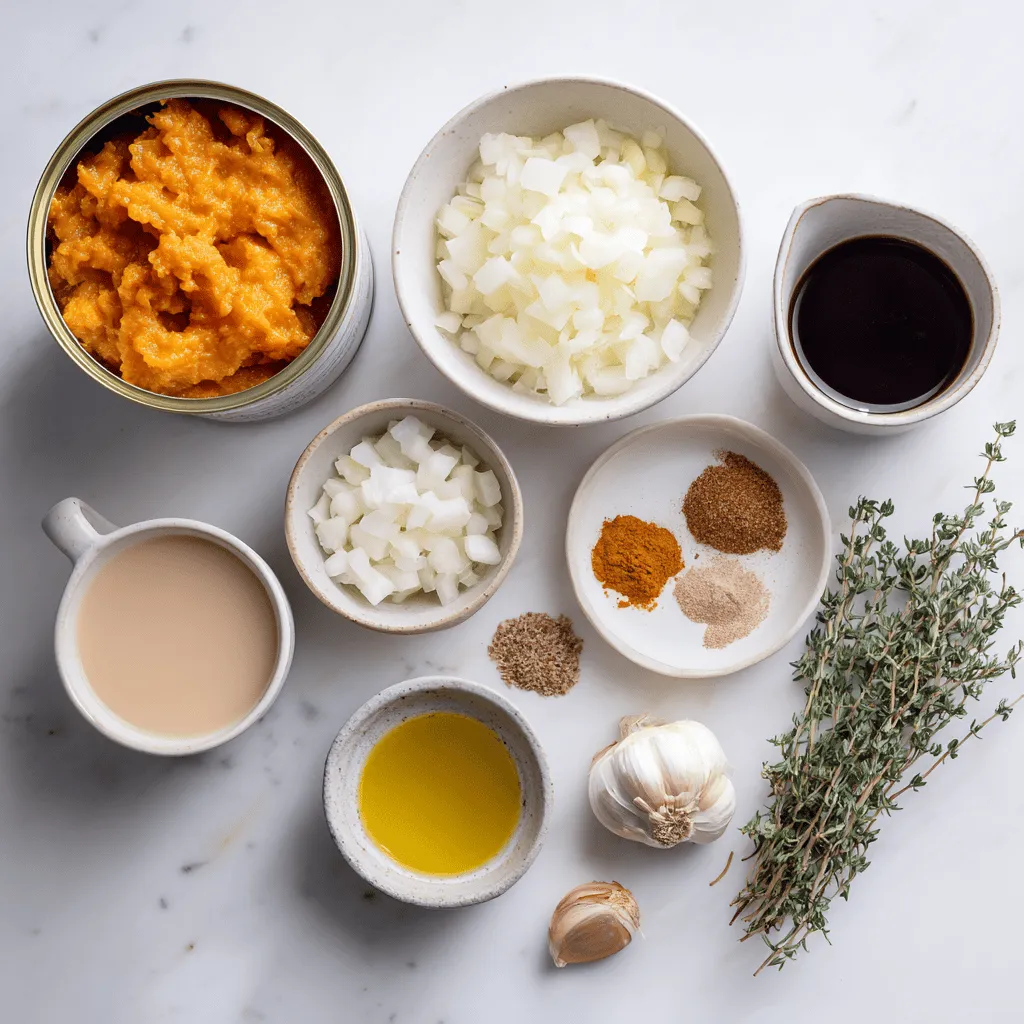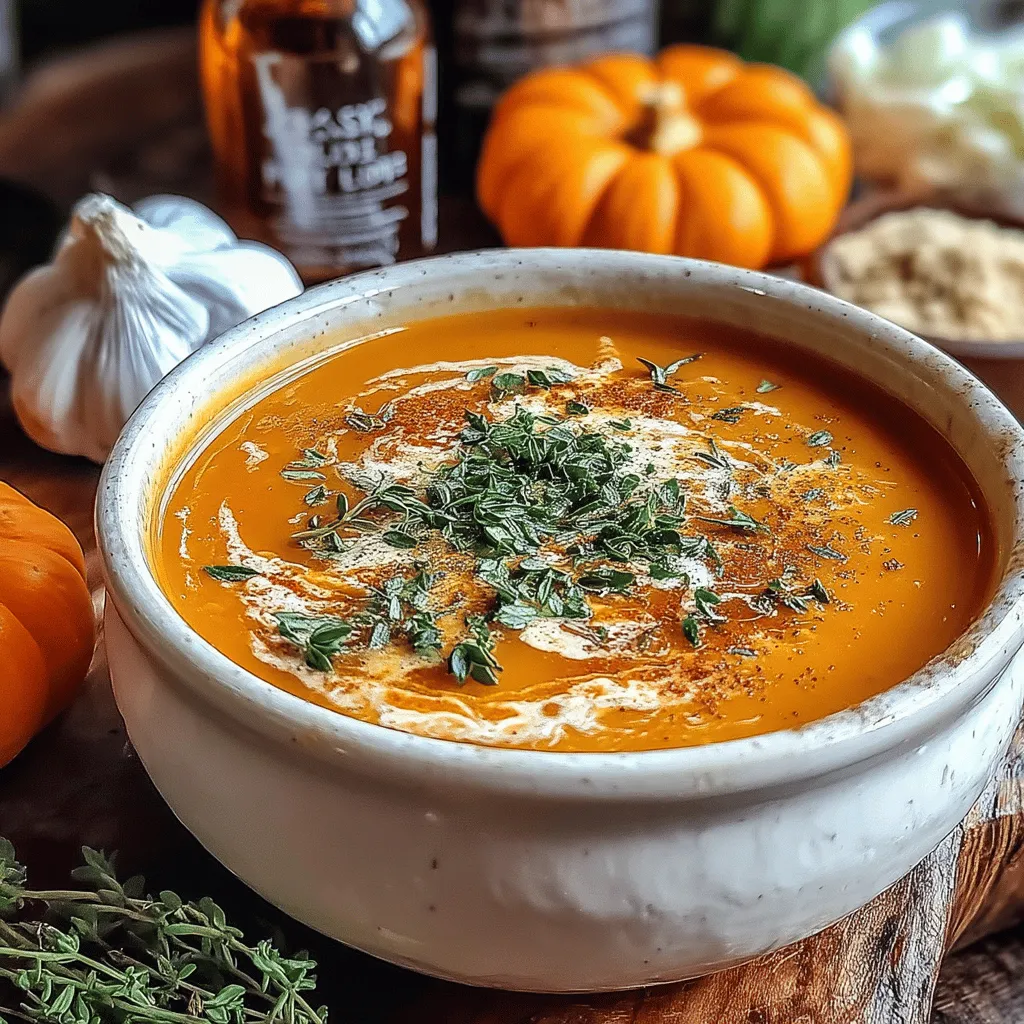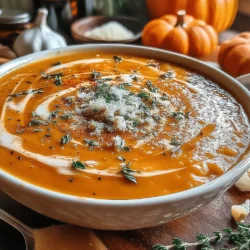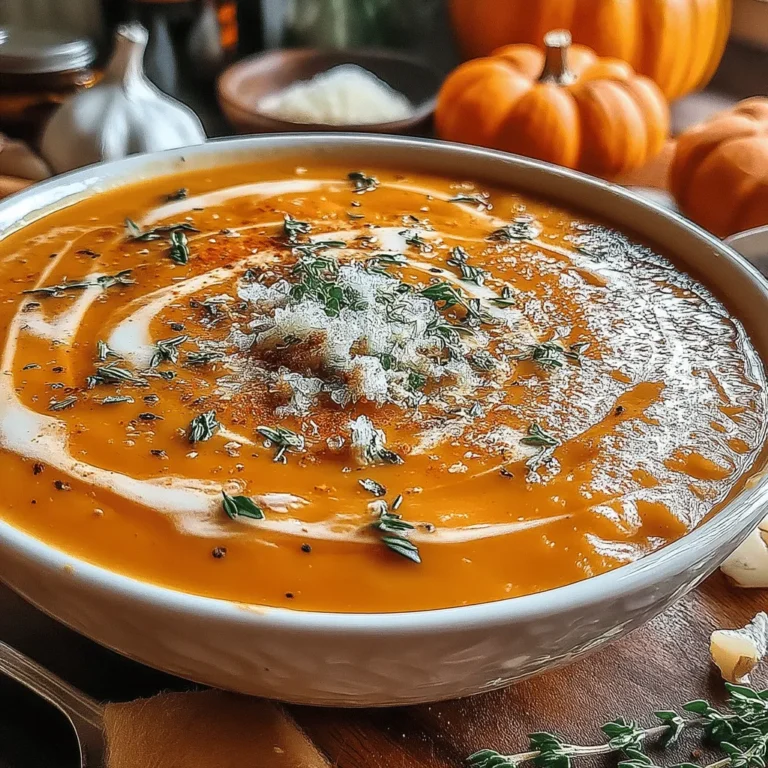Introduction
Warm and Wholesome Pumpkin Spice Soup is a comforting dish that perfectly embodies the flavors of autumn. With its rich pumpkin puree, aromatic spices, and creamy coconut milk, this soup is not only delicious but also nourishing. In this article, we will explore the various aspects of making this delightful soup, from understanding its health benefits to step-by-step instructions for preparing it. This recipe is perfect for cozy nights in, gatherings with friends, or as a hearty meal during chilly days.
Recipe Overview
– Total Time: 45 minutes
– Servings: 4
– Difficulty: Easy
Ingredients
– 2 cups pumpkin puree
– 1 can (13.5 oz) coconut milk
– 1 medium onion, chopped
– 2 cloves garlic, minced
– 2 cups vegetable broth
– 1 tablespoon pumpkin pie spice
– 1 teaspoon fresh ginger, grated
– 2 tablespoons maple syrup
– Salt and pepper to taste
– Olive oil for sautéing

Instructions
1. Heat olive oil in a large pot over medium heat. Add chopped onions and sauté until translucent.
2. Stir in minced garlic and sauté for an additional minute until fragrant.
3. Add the pumpkin puree, coconut milk, and vegetable broth to the pot. Stir well to combine.
4. Season the mixture with pumpkin pie spice, grated ginger, and maple syrup. Mix thoroughly.
5. Bring the soup to a gentle simmer. Allow it to cook for about 20 minutes, stirring occasionally.
6. Use an immersion blender to puree the soup until smooth, or transfer it to a blender in batches.
7. Taste and adjust seasoning with salt and pepper as needed.
8. Serve warm, garnished with a drizzle of coconut milk or a sprinkle of pumpkin spice if desired.
The Health Benefits of Pumpkin
Exploring Nutritional Value
– Overview of key nutrients found in pumpkin
– Benefits of consuming pumpkin in diet
Pumpkin as a Superfood
– Rich in vitamins A, C, and E
– High in fiber and low in calories
– Antioxidant properties
Ingredients Breakdown
Essential Components of the Recipe
– Overview of the main ingredients: pumpkin puree, coconut milk, spices
– Importance of using fresh versus canned ingredients
Flavor Enhancers
– Role of garlic and onion in enhancing taste
– Benefits of maple syrup as a natural sweetener
– The significance of spices like pumpkin pie spice and ginger
Step-by-Step Preparation
Sautéing Aromatics for Flavor
– Importance of sautéing onions and garlic
– Tips for achieving the perfect sauté
Combining Ingredients in the Crockpot

Tips for Optimal Flavor and Texture
How to Layer Ingredients for Optimal Flavor Melding
To achieve the most flavorful pumpkin spice soup, start by layering your ingredients wisely. Begin with the aromatics like onions, garlic, and spices at the bottom of your crockpot. This allows their flavors to infuse into the broth as they cook. Next, add your pumpkin puree and any other vegetables, followed by the broth. This method ensures a harmonious blend of flavors as they meld together throughout the cooking process.
Importance of Stirring to Combine Flavors
Stirring is crucial in maximizing the flavor profile of your soup. As the ingredients cook, make sure to stir occasionally to combine the layers and prevent sticking. This simple step helps to ensure that every spoonful is rich in flavor, allowing the spices and pumpkin to meld beautifully.
Cooking Time and Temperature
Differences Between Low and High Settings on a Crockpot
When using a crockpot, understanding the difference between low and high settings can significantly affect your soup’s outcome. Cooking on low typically allows for a longer, slower meld of flavors, enhancing the soup’s depth. Conversely, using the high setting will speed up cooking time but may result in a less developed flavor profile. For the best results, consider aiming for low heat when time permits.
How to Know When the Soup is Ready
Your soup is ready when the vegetables are tender and easily pierced with a fork and the flavors have come together harmoniously. If using a thermometer, the internal temperature should reach at least 165°F. A taste test is also a great way to confirm readiness—flavors should be balanced and inviting.
Blending for Texture
When to Blend and How It Affects the Soup’s Consistency
Blending your soup can transform its texture from chunky to creamy. Blend the soup once all ingredients are cooked and tender. For a velvety consistency, blend until smooth. If you prefer a bit more texture, blend only a portion of the soup or use a fork to mash some of the ingredients.
Different Blending Methods: Immersion Blender vs. Standard Blender
An immersion blender is ideal for pureeing soup directly in the pot, minimizing mess and allowing for easy adjustments. If you opt for a standard blender, allow the soup to cool slightly before blending in batches. Always use caution when blending hot liquids to avoid splatters.
Taste Testing and Adjustments
The Importance of Adjusting Flavors to Personal Preference
Taste testing is essential for achieving a soup that suits your palate. Once blended, taste the soup and consider it for seasoning adjustments. This is the perfect time to enhance flavors with additional spices, salt, or even a touch of sweetness.
Suggested Modifications for Sweetness and Spice Levels
Depending on your preference, you may want to adjust the sweetness or spice levels. If the soup is too spicy, consider adding a splash of cream or coconut milk to mellow the heat. Conversely, if you desire more sweetness, a drizzle of maple syrup or a sprinkle of brown sugar can enhance the flavor profile without overpowering it.
Serving Suggestions
Presentation and Garnishing
Presentation can elevate the dining experience. Consider garnishing your pumpkin spice soup with a swirl of cream, pumpkin seeds, or fresh herbs such as cilantro or parsley. These additions not only enhance visual appeal but also add complementary flavors.
Serving with Complementary Sides
Pair your soup with crusty bread for dipping or a light salad to balance the richness of the soup. A fresh side salad with citrus vinaigrette can provide a refreshing contrast, making for a well-rounded meal.
Pairing with Beverages
Selecting the right beverage can enhance your soup experience. For non-alcoholic options, consider pairing with a spiced apple cider or a light herbal tea. If you’re looking for something alcoholic, a crisp white wine or light beer can complement the rich flavors of the pumpkin spice soup beautifully.
Storing and Reheating Your Soup
Best Practices for Storing
To maintain the freshness and flavor of your soup, store it in an airtight container in the refrigerator for up to five days. For longer storage, you can freeze the soup in portioned containers, making it easy to enjoy later. Be sure to leave room for expansion when freezing.
Tips for Reheating Without Losing Flavor
When reheating, do so gently on the stove over low heat, stirring occasionally. If the soup appears too thick, add a splash of broth or water to help regain its desired consistency. Avoid microwaving in high heat settings, as this can alter the texture and flavor.
Conclusion
Warm and Wholesome Pumpkin Spice Soup is a delightful way to embrace the flavors of the season while providing comfort and nourishment. With its ease of preparation and adaptability, this recipe can become a staple in your home. Whether you savor it alone or share it with loved ones, this soup is sure to bring warmth and satisfaction to your dining experience. Enjoy the process of making it and the cozy moments it creates!

